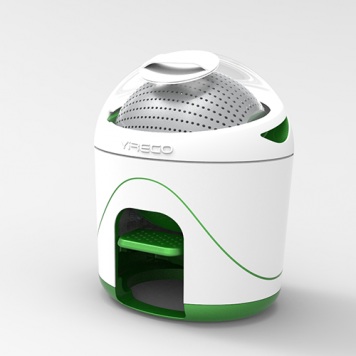
Foot-powered washing machine wins Canadian leg of the James Dyson Award
By Design Engineering staff
General James Dyson Award slideshowThe Drumi, designed by OCAD student, requires no electricity and has no carbon emissions.
 The Drumi, designed by industrial design student Yi Jiang from the Ontario College of Art and Design University, has won the Canadian leg of the James Dyson Award. The small device is a foot powered washing machine that requires small amounts of water and no electricity.
The Drumi, designed by industrial design student Yi Jiang from the Ontario College of Art and Design University, has won the Canadian leg of the James Dyson Award. The small device is a foot powered washing machine that requires small amounts of water and no electricity.
The 15-pound Drumi uses only 10 litres of water between the wash and rinse cycle and has a capacity of up to five pounds of clothing per load, approximately seven personal items, a pair of jeans or three sweaters.
“Drumi was born from personal experience,” Industrial designer Yi Jiang said. “I was living in a downtown Toronto apartment building with access to communal, coin-operated laundry facilities in the basement. Fed up with always having to keep quarters on hand and having to share machines with others, I set to work. I quickly found the solution to my personal problem discovered I could also solve wider issues of sustainability and hygiene in washing machine use.”
Development of the Drumi began in 2012 as Jiang’s final thesis project. Original designs were for a compact laundry machine that used electricity and a top-loading drum, however he quickly turned to electricity-free models. Today, the Drumi is in the final stages of product development.
For winning the Canadian leg of the annual international design competition, Jiang will receive $3,600 to commercialize his project and will progress to the international stage of the award.
Other Canadian finalists include:
The CE Light, by University of Saskatchewan’s Michael Konieczny, is a multifunctional device that contains a high efficiency flashlight, a UVC water sterilization add-on, or an adapter to charge small electronics.
Grasp, created by a University of Waterloo mechatronic engineering team, is a biometric bicycle lock that connects to a smartphone via low energy Bluetooth, so users can open the lock by fingerprint identification.
The Screw Cutter Project device, by a biomedical engineering team at University of British Columbia, helps surgeons create custom screws to treat injuries when access to surgical screws is not readily available.
Voltera V-One, by another University of Waterloo mechatronics engineering team, is a custom circuit board printer, with swappable print heads for the conductive ink and an insulating ink that allows the machine to create masks for two layer boards. The printer automatically dispenses solder paste and bakes the board.
All five Canadian entries move onto the next stage of the competition, where a panel of Dyson engineers will judge a total of 100 entries from 20 participating countries to a top 20 international shortlist.
www.jamesdysonaward.org/projects
